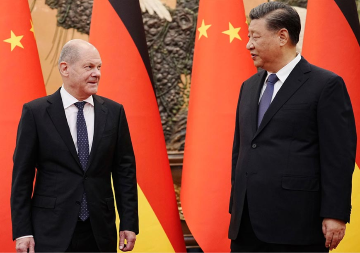Months after the Indian government
endorsed the “multistakeholder” model of internet governance – at the 53rd meeting of the Internet Corporation for Assigned Names and Numbers (ICANN) – the Indian position is being carefully calibrated. The “re-alignment” may culminate in a landmark cyber deal this year between India and Russia, which if signed, would be a game-changer not just in this space but for Indian foreign policy as a whole. Its statement at ICANN 53 in June 2015 had left several governments wondering if India’s cyber-politics had transformed dramatically, acquiescing to what essentially were rules of the road set by the United States. India has sought to clarify its stand in recent months, prompted not least by a lingering perception that the US has not sufficiently appreciated Indian overtures, even as the Obama administration inked a potentially norm-setting bilateral agreement on cyber security with China.
The Indian position is unlikely to track back to supporting inter-governmental models of internet governance. There is sufficient evidence, anecdotal and documentary, to suggest the ICANN 53 endorsement did not reflect an exceptional moment in Indian diplomacy. The BRICS summit in Ufa
last year saw Indian negotiators tempering the draft outcome document circulated by their Russian hosts, succeeding eventually in removing several references to multilateral internet governance. At the high-level meet to review the outcomes of the World Summit on Information Society in December 2015, India played a pivotal role in crafting the declaration that was subsequently adopted by the UN General Assembly. Several countries, including those in the G-77 bloc of countries, had pushed for greater governmental say in cyber policies, leading India to distance itself from the group. This is no small measure, for the G77 is the bedrock of collective bargaining by developing countries on most burning issues at the UN, save reform of the UN Security Council.
From multilateral to multi-stakeholder
There’s more: at a discussion last week with a small group of representatives from businesses and civil society, outgoing president and CEO of ICANN, Fadi Chehade made an astonishing revelation. Mr. Chehade, referring to the WSIS + 10 review document, said: “The government of India stood up in New York this December and asked the drafters to do a ‘find and replace’ in the document to replace every occurrence of the word ‘multilateral’ to ‘multi-stakeholder’.” Officials in New Delhi corroborated Mr. Chehade’s statement, while acknowledging India’s support for multistakeholderism was as much principled as it was a bargaining chip. Time will tell whether the bargains will pay off, but the WSIS outcome document does reflect two key initiatives India has pushed for at the UN.
First, the Technology Facilitation Mechanism, expected to be a platform to promote technology transfer and climate financing, has been prominently endorsed in the document.
Second, the WSIS outcomes will be periodically reviewed and reports annually submitted to a UN Commission, effectively ensuring that the door for inter-governmental policy making is not fully closed. But these bargains were struck in New York thanks largely to the rapport between the Indian delegation and WSIS co-facilitators from the UAE and Latvia, who led the drafting process.
It would not be an exaggeration to claim the India-Russia deal may trigger a series of agreements that end in India’s entry into the export control regime
Progress on India-US engagement on cyber issues, however, remains sketchy. Despite several rounds of bilateral and multilateral talks, both sides have struggled to highlight major achievements either on security-related matters or on the governance of shared critical resources backstopping the internet. In contrast, the Obama administration signed a far-reaching agreement on cybersecurity with China during President Xi Jinping’s state visit last September. The US-China agreement is the first among major powers to codify the recommendations proposed by the 2015 UN Group of Governmental Experts on cyber security (GGE). In signing such a deal, China – which has rarely contributed to creating international norms in the long history of multilateral negotiations – has grabbed a rare opportunity to define the global cyber landscape, despite its stated divergence with the US view on Internet governance.
As a consequence, Indian negotiators are looking elsewhere to help shape cyber norms, especially on security concerns. When the Shanghai Cooperation Organisation (SCO) meets in Tashkent this June – its first summit in which India will participate as a full member – the group’s joint declaration will feature cyber security prominently, which India is likely to endorse. Indeed, India has been contributing to the draft, which is currently being reviewed in ministries.
Look towards the Russians
Significantly, New Delhi is in the early stages of negotiating a “Memorandum of Understanding on Information Security” with Russia. The timing of the deal will be crucial. Even if subsequent MoUs were to be signed with the United States and others, an India-Russia cyber deal will send the unambiguous signal that Moscow remains a preferred partner for strategic cooperation. The MoU would bring Russia in from the cold, subjected as it has been to sweeping technology sanctions by the United States post-Crimea. For India, this will be the first bilateral agreement on cyber security with a party to the Wassenaar Arrangement on Export Controls for Conventional Arms and Dual-Use Goods and Technologies. It would not be an exaggeration to claim the India-Russia deal may trigger a series of agreements that end in India’s entry into the export control regime. When the 2016 UN GGE convenes – with India likely to be a member this time – such an MoU would affect the political dynamic in a group that sees the major cyber powers come together for the first time to draft rules of peacetime cyber engagement.
With Russia and other key players like the UAE and Japan in its sights, New Delhi is finally playing smart cyber-politics. Arguably, India’s overtures towards multistakeholderism have not translated into strategic currency at the high table of Internet governance. The IANA transition is nearing completion, but its outcome is now being criticised from several quarters as an exercise in optics, without any real change in the US-centric running of the domain name system (DNS). As Mr. Chehade himself acknowledged last week, there is not “truly a single representative from India” – government or otherwise – in the Board of Directors at ICANN. 2016 will be a crucial year for cyber diplomacy, with several venues – the UN GGE, the Tallinn Manual 2.0 and the ASEAN Regional Forum – competing for influence in the creation of international norms on security and internet governance. India would do well to reach out to the broadest possible set of interlocutors as it sets out to help influence the emerging cyber regime.
This commentary originally appeared in The Wire
The views expressed above belong to the author(s). ORF research and analyses now available on Telegram! Click here to access our curated content — blogs, longforms and interviews.

 PREV
PREV

